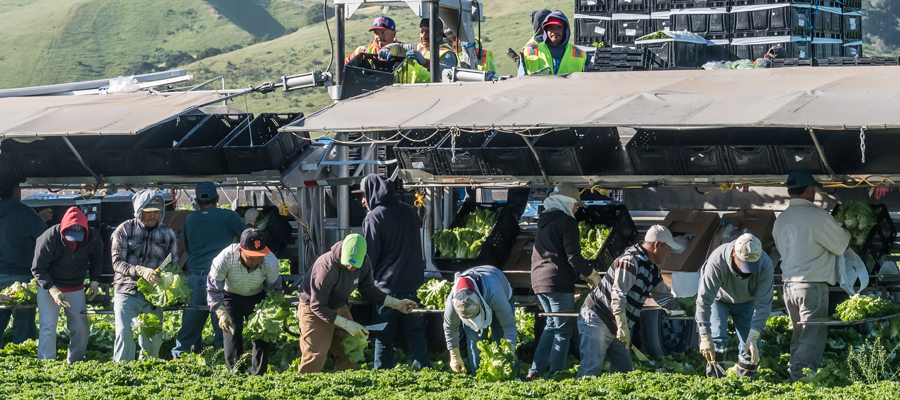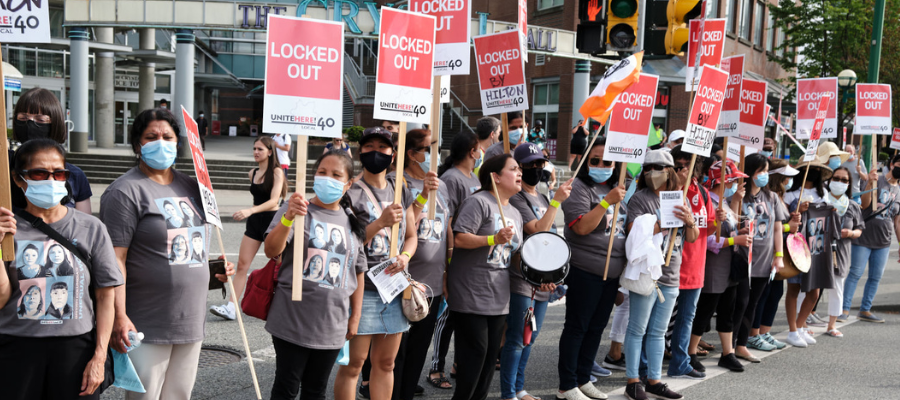Protecting the health and rights of migrant agricultural workers during the COVID-19 outbreak should be a priority

Manually skilled migrant workers contribute vitally to the Canadian food chain, including to agricultural and seafood industries. But food security cannot be achieved on the backs of workers who are denied equal access to social protections and benefits, and made uniquely vulnerable to coronavirus transmission. With news about this week’s community outbreak among migrant agricultural workers in West Kelowna, the enormity of the stakes became clear.
For many, the federal government’s March 20th announcement that migrant workers would be exempt from COVID-19 air travel restrictions came as a relief. Canadian farm business owners feared they would be unable to hire 60,000 migrant agricultural workers, primarily from Mexico and Caribbean countries. Concerns about potential food shortages, along with the viability of both farmers’ and workers’ livelihoods had loomed large.
Like many other policies governing workers across the Canadian food chain, the travel exemption is heavily skewed toward industry interests. Missing from the picture are the priorities of labour, migrant justice and sustainable farming movements. These priorities point to the heart of the matter: despite their crucial role in Canadian food production, processing and distribution, migrant workers are at a high risk of illness, injury and isolation. Canadian employment and immigration policies create this susceptibility by limiting workers’ ability to freely circulate in the labour market, and by making them deportable. Without a coordinated plan for enforcement, federal government advice to employers on how to prevent the spread of COVID-19 among migrant workers is risky and toothless. Public health experts, rather than industry groups or individual employers, should oversee protocols to safeguard migrant workers’ health in light of the pandemic.
Food security cannot be achieved on the backs of workers who are denied equal access to social protections and benefits.
To mitigate these risks, particularly in a pandemic, we need to address the conditions that make migrant workers uniquely vulnerable. Given the complexities and high stakes, the responsibility for supporting migrant workers’ health can’t be left up to individual employers or industry organizations. Public health experts must oversee migrant workers’ safety and protection. They should collaborate with migrant worker organizations to develop specialized guidelines for health and safety, providing support for employers and workers to quickly transition to new protocols. Here, we flag some key considerations.
Migrant workers’ precarity begins when they enter Canada without families, and have limited local resources or social contacts. During the mandatory 14-day quarantine period upon arrival, workers should be provided with clear information in their language as well as wages, food and other necessities, including a safe place to practice social distancing. Many workers arrive in rural communities without access to basic essentials normally available in their local grocery stores, with some reports of not even being able to purchase toilet paper. Crucial supplies such as hygienic products could be purchased in advance for workers. After the quarantine period, to avoid overcrowding during grocery trips, workers in isolated rural areas could be provided with regular safe, staggered, third-party transportation services.
Because some farmworkers face overcrowded housing and limited field sanitation, following public health directives can be difficult. While providing workplace training, the government should ensure support for social distancing within worker accommodations and workplaces, and increase sanitation facilities. Local health authorities should provide specialized locations where symptomatic workers can self-isolate to avoid causing an outbreak in close quarters.
We need to address the conditions that make migrant workers uniquely vulnerable.
Our research has also shown migrant workers experience particular barriers to accessing health care. Migrant workers should also have access to free tele-health consultations in their languages so they can receive prompt and safe health advice. In the absence of accessible primary care, some rely on emergency departments for routine health concerns. This is never ideal, but is particularly concerning during the COVID-19 outbreak. In some communities, specialized clinics have begun to provide care to these workers, and such efforts should be enhanced and expanded. Measures to protect the privacy and autonomy of migrant workers must take into account the coercive conditions some face when seeking care.
Migrant workers are among the most precarious in the economy, with our previous research demonstrating many are afraid to take time off of work when ill for fear of losing their jobs. Employment Insurance should be made immediately available to migrant workers who cannot work due to illness, with the same rules that apply to Canadians. Employment protections need to be heightened so that workers don’t face employer retaliations for taking time off due to illness. These changes must be clearly communicated to both employers and workers. Moreover, a range of government supports to ensure farm employment can offer livable wages and equal access to social protections could also help make this sector more viable for Canadian residents facing unemployment due to COVID-19.
Even under typical conditions, migrant workers experience social isolation and mental health concerns.
Even under typical conditions, migrant workers experience social isolation and mental health concerns. It is imperative to support the well-being of workers separated from their families, including parents living away from young children. Workers who normally rely on public facilities like libraries to access the internet may be unable to connect even virtually with their loved ones. The government could enact special provisions to ensure workers have a way to connect with family back home (e.g. phones, internet and video conferencing apps like Skype on farms), along with safe inclusion in Canadian communities (e.g. virtual religious services, cultural events and workplace rights training). Such programming can also facilitate ongoing communication with members of our communities who will likely have limited access to updates about precautions and local virus transmission.
As others have observed, the pandemic forces us to reflect on how our society systematically undervalues supposedly ‘low-skill’ workers whose contributions are, in fact, at the heart of our collective well-being. This is especially true for workers marginalized by race, class, gender and immigration status, including cashiers, restaurant servers and food delivery workers, along with migrant workers across the food chain. It’s also true for workers who care for children, people with disabilities and the elderly (migrant caregivers are also exempt from the travel restrictions). How do we build a society that begins to recognize and materially reward their crucial contributions?
We urge against using this crisis as an excuse to double down on policies that degrade food chain workers’ bargaining power, job security and working conditions, or to heighten xenophobia against migrant workers. Policies that undermine workers’ rights under the guise of crisis circumstances are hard to undo later. We now have a unique opportunity to build a world of work that materially supports everyone’s dignity, and a food system that allows everyone to thrive.
Topics: COVID-19, Employment & labour, Immigrants & refugees


